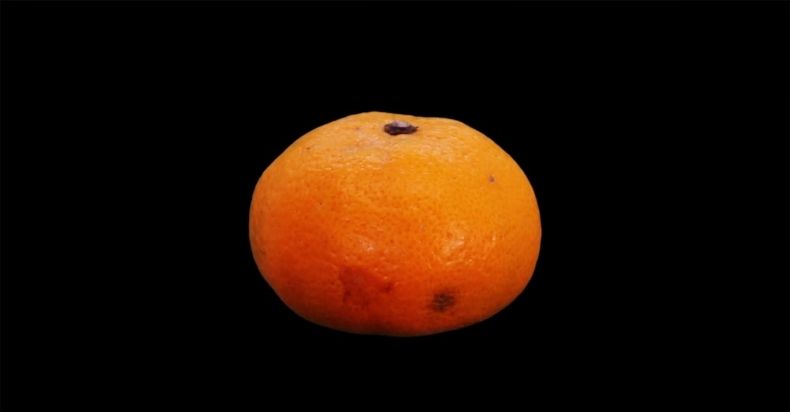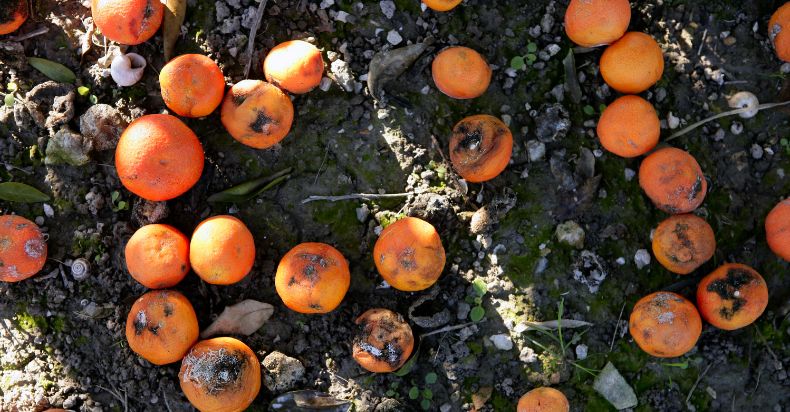If the black spots are just a result of the fruit aging or getting bruised, then yes, you can still eat it. The taste and texture might be slightly different, but it’s generally safe to consume. Just make sure to cut away the spotted area before eating.
Citrus fruits, huh? They’re like the life of the party in the fruit world. Bright, zesty, and bursting with flavor, they’re a favorite among fruit lovers everywhere. From the tangy lemon to the sweet orange, the juicy grapefruit to the exotic pomelo, there’s a citrus fruit for every taste.
But here’s something that might have you scratching your head. Ever peeled a citrus fruit and found black spots on the flesh? Kind of like someone took a tiny black marker and dotted your fruit? Yeah, that. It’s a bit of a downer, isn’t it? You’re all set to enjoy a juicy orange or a tangy lemon, and then…black spots.
These black spots can be quite perplexing. They don’t look particularly appetizing, and they can make you question whether the fruit is safe to eat. After all, we’re often told to avoid fruits and vegetables with blemishes or discolorations. But are black spots in citrus fruits the same as mold in bread or bruises in apples? Or is it something else entirely?
The mystery of the black spots in citrus fruits is what we’re going to unravel in this article. We’ll delve into what causes these spots, whether they pose any health risks, and how to handle citrus fruits with black spots.
So, buckle up and get ready for a deep dive into the world of citrus!
What Causes Black Spots on Citrus Fruits?

Alright, let’s get down to business. What’s causing these pesky black spots on your citrus fruits? Well, there could be a few culprits.
One common cause is a fungal disease known as citrus black spot. This disease is caused by a type of fungus that thrives in warm, wet conditions. It causes dark, sunken spots on the fruit’s skin and can sometimes affect the flesh as well.
Another possible cause is a condition known as Alternaria rot. This is another fungal disease that can cause black spots on citrus fruits, particularly oranges. The spots usually start as small, dark specks and can grow larger over time.
Sometimes, the black spots might not be due to a disease at all. They could simply be a result of the fruit aging or getting bruised. Just like how an apple can get brown spots if it’s been sitting out for too long, citrus fruits can get black spots when they’re past their prime or have been mishandled.
READ : Is It Safe to Eat Mushrooms With Brown Spots?
Are Black Spots a Sign of Disease or Decay?

Now, you might be thinking, “Disease? Decay? Should I be worried?” Well, not necessarily. While black spots can be a sign of these issues, they don’t always mean your citrus fruit is bad or unsafe to eat.
If the black spots are due to aging or bruising, they’re usually just superficial and don’t affect the fruit’s safety or taste. You can simply cut away the spotted area and enjoy the rest of the fruit as usual.
However, if the spots are caused by a fungal disease like citrus black spot or Alternaria rot, it’s a different story. These diseases can affect the fruit’s quality and safety. While they’re not harmful to humans, they can make the fruit taste bad and can lead to further decay if not addressed.
So, as you can see, black spots on citrus fruits can mean different things. It’s all about understanding what’s causing them and making an informed decision about whether to eat the fruit or not. But don’t worry, we’ll delve deeper into this in the next section. Stay tuned!
READ : Why Does Kiwi Burn My Mouth?
Can You Eat Citrus Fruits with Black Spots?

So, here’s the million-dollar question: Can you eat citrus fruits with black spots? Well, as with many things in life, the answer is… it depends.
I know, I know, you were probably hoping for a straightforward ‘yes’ or ‘no’. But when it comes to food safety, it’s rarely that simple.
If the black spots are just a result of the fruit aging or getting bruised, then yes, you can still eat it. The taste and texture might be slightly different, but it’s generally safe to consume. Just make sure to cut away the spotted area before eating.
However, if the black spots are due to a fungal disease like citrus black spot or Alternaria rot, it’s a different story. While these diseases are not harmful to humans, they can affect the fruit’s quality and taste.
The fruit might be more sour or bitter than usual, or it might have a mushy texture. In this case, it’s best to discard the fruit to avoid a less-than-pleasant eating experience.
READ : 9 Surprising Reasons Why Your Mango Is Brown Inside
Health Risks Associated with Eating Spoiled Citrus Fruits
Now, you might be wondering, “What’s the worst that could happen if I eat a citrus fruit with black spots?”
Well, if the spots are due to aging or bruising, not much. You might not enjoy the taste or texture as much, but it’s unlikely to make you sick.
However, if the fruit is significantly decayed or moldy, it could potentially cause foodborne illness. Symptoms can range from mild (like stomach upset) to more severe (like vomiting and diarrhea).
So, while it might seem like a waste to throw away a citrus fruit with black spots, it’s not worth risking your health.
In the next section, we’ll talk about how to properly handle and store citrus fruits to prevent black spots. So, keep reading!
How to Properly Handle and Store Citrus Fruits?
Selecting the Best Citrus Fruits
First things first, let’s talk about how to pick the best citrus fruits. When you’re at the grocery store or farmers market, look for fruits that are firm, shiny, and heavy for their size.
The skin should be smooth and vibrant, with no signs of blemishes, soft spots, or black spots.
Remember, the best defense against black spots is to start with a healthy, high-quality fruit. So, take your time and choose wisely!
Proper Storage to Prevent Black Spots
Now, once you’ve got your perfect citrus fruits, how do you keep them that way? Proper storage is key. Citrus fruits like cool, but not too cold, temperatures. The vegetable drawer in your refrigerator is usually a good spot.
Store your citrus fruits in a mesh bag or a perforated plastic bag to allow for air circulation. This can help prevent moisture buildup, which can lead to mold growth.
If you’ve cut into a citrus fruit but didn’t use all of it, no worries! Just store the leftover fruit in a sealed container in the fridge. It’s best to use it within a couple of days to enjoy it at its freshest.
By selecting good quality citrus fruits and storing them properly, you can enjoy these zesty and nutritious fruits without worrying about black spots.
Verdict: To Eat or Not to Eat? Solving the Citrus Dilemma
So, there you have it! The mystery of the black spots in citrus fruits, solved. As we’ve learned, these spots can be caused by a number of things, from simple aging to fungal diseases.
Whether or not it’s safe to eat a citrus fruit with black spots really depends on what’s causing the spots.
If it’s just a case of the fruit getting a bit old or bruised, then it’s generally safe to eat. But if there’s a chance the spots are due to a fungal disease, it’s best to play it safe and discard the fruit. Remember, it’s not worth risking your health over a piece of fruit!
And of course, the best way to avoid this dilemma is to prevent black spots in the first place. By choosing high-quality citrus fruits and storing them properly, you can enjoy these zesty and nutritious fruits without worry.
Frequently Asked Questions
Can citrus fruits with black spots make you sick?
If the black spots are due to significant decay or mold, then yes, eating the citrus fruit could potentially make you sick.
Symptoms of foodborne illness can include nausea, vomiting, diarrhea, and abdominal pain. If you’re unsure whether your citrus fruit is safe to eat, it’s best to err on the side of caution and discard it.
How can I tell if a citrus fruit is bad?
A bad citrus fruit may have soft spots, wrinkles, or areas of dark discoloration.
It may also have a rotten smell or a slimy texture. If your citrus fruit has any of these signs, it’s best to throw it away.
How long do citrus fruits last in the fridge?
Whole citrus fruits can last for 1-2 weeks in the fridge, while cut citrus fruits should be used within 2-3 days for the best quality.
Can you eat the peel of a citrus fruit?
Yes, the peel of a citrus fruit is safe to eat and is actually quite nutritious.
However, it can be bitter and tough, so it’s usually used in small amounts as a zest or garnish.
If you plan to eat the peel, make sure to wash the fruit thoroughly to remove any dirt or pesticides.
Are citrus fruits healthy?
Absolutely! Citrus fruits are low in calories and rich in vitamins and minerals, particularly Vitamin C and various phytochemicals.
These nutrients have antioxidant properties, which can help protect your body against damage from harmful free radicals.
So, citrus fruits are not just tasty, but also good for your health.
